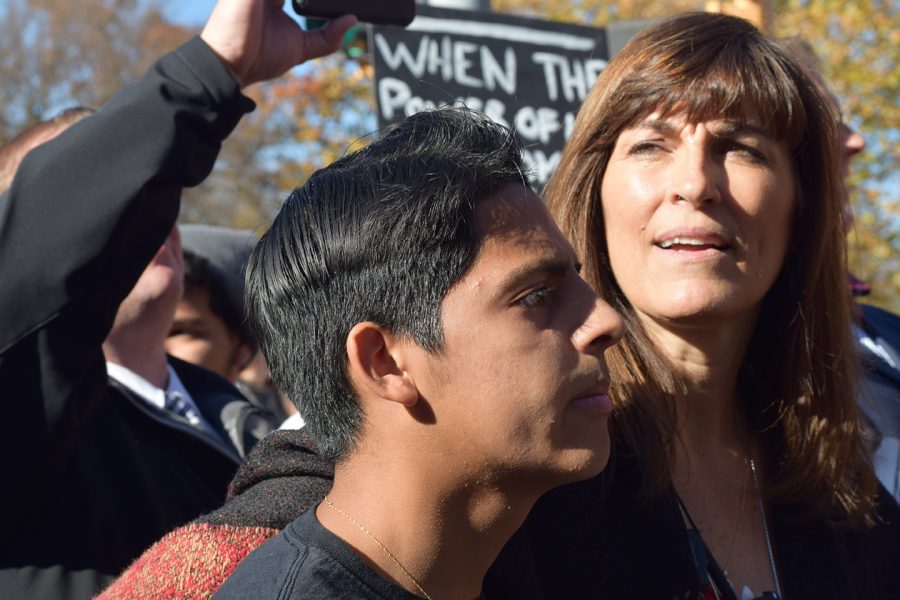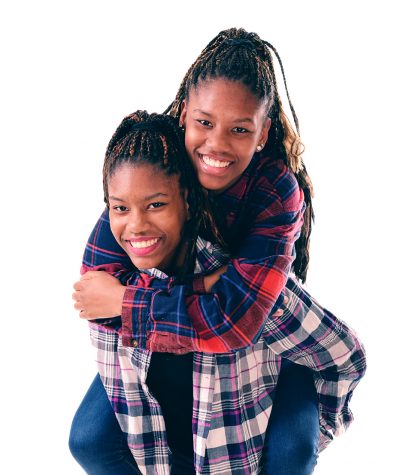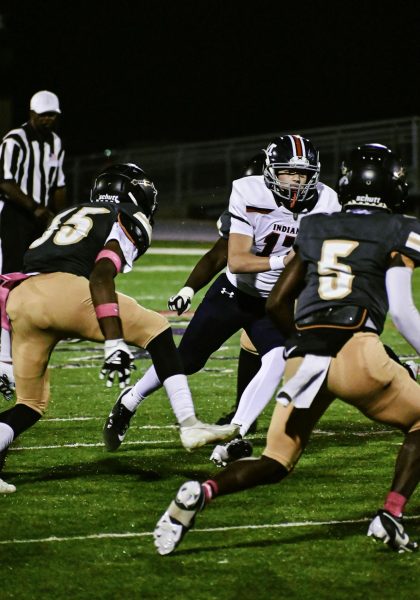Political Difference and Education
Angelo Campos, senior, and Rebecca Morrisey, principal, at the Unity Walk.
Welcome to the world post-Donald.
Today, Topeka High held a “Unity Walk” in the wake of the presidential election.
Donald Trump’s victory had material implications for many at the school, with reports of students being harassed based on their race.
Students have the right to be angry.
Donald Trumps campaign rhetoric and behavior towards other people are a poignant counter example of the values on which an egalitarian and mutually supportive society are based. There is no question of the president-elect’s tendency to attack people based on their identity.
He, throughout the course of his campaign, advocated for banning people from the Middle East and building a wall to exclude all the “bad hombres” from Mexico.
He attacked numerous women based on their appearance as a way to discount their arguments, saying of Carly Fiorina, a republican primary contender, “Look at that face, would anyone vote for that?” Numerous recordings of Trump surfaced over the course of the past year in which the now-president-elect-former-reality-TV-star bragged about his lewd behavior at the expense of women. Trump has bragged about sexual assault, using grossly demeaning language to describe women. This is apparent in this conversation (credit to the Washington Post for the transcript):
“I moved on her like a bitch, but I couldn’t get there. And she was married,” Trump says. “Then all of a sudden I see her, she’s now got the big phony tits and everything. She’s totally changed her look.”
At that point in the audio, Trump and Bush appear to notice Arianne Zucker, the actress who is waiting to escort them into the soap-opera set.
“Your girl’s hot as s—, in the purple,” says Bush, who’s now a co-host of NBC’s “Today” show.
“Whoa!” Trump says. “Whoa!”
“I’ve got to use some Tic Tacs, just in case I start kissing her,” Trump says. “You know I’m automatically attracted to beautiful — I just start kissing them. It’s like a magnet. Just kiss. I don’t even wait.”
“And when you’re a star, they let you do it,” Trump says. “You can do anything.”
“Whatever you want,” says another voice, apparently Bush’s.
“Grab them by the p—y,” Trump says. “You can do anything.”
The impact of Donald’s election is not necessarily that everyone that isn’t a cisgendered, straight, white man will be discriminated against legally, but the impact of Trump’s behavior and language being validated is that these things become apparently acceptable.
In response to the election, many students took it upon themselves to speak out based on their personal beliefs. A number of organized meetings have occurred since the election, but a call for a walkout from school to protest Donald Trump by Angelo Campos got the attention of the school administration.
The response of the school to offer to support/organize a walkout is vastly damaging to the political agency of the students who wished to make a statement. The school dictates the method and the message of the demonstration. School approved signs and a silencing of angry students do nothing to affect change, and the shouting of uninspired hundreds crowds out the voices of a politically motivated few.
Students have the right to be angry.
The administration cannot be faulted for attempting to ensure the safety of its students, but the idea that the unity walk is more mature, more righteous than an authentic protest is either a façade or a delusion. To claim that a school managed unity walk is more conducive to a “learning environment” is both a mis-prioritization of classroom education over an understanding of political reality and comforting ruse to suggest to the administration that they have sufficiently addressed the tension that exists both inside and outside of the school.
Unity, which effectively translates to passivity and political homogeneity, is not a functional strategy for engaging the normalization of the rhetoric of hate, discrimination, and dehumanization and the impending potential codification of hatred, discrimination, and dehumanization.
Students should not hate each other, but no one should tolerate – or be expected to face – the sort of rhetoric that Donald Trump’s campaign has brought to the center of American politics.
Students have the right to be angry.
Denouncing hatred and having zero tolerance for racism, misogyny, or any other form of bigotry that alienates people because of their identity is crucial, but the only way to do that is to step away from institutions that tell us to quite down and focus on something else, even if its something as important as education.
Education will affect our futures, but Donald Trump is our present and the policies implemented during his presidency may be our future.
Especially for high school students, many of whom cannot yet vote, the most powerful way to shape the world is to take personal action.
The administration has immense power over students, it should absolutely never use that power to dictate what students are allowed to believe or of what they can demonstrate in support of. The domination of a student protest by the administration is even more damaging to student political agency than punishing the participants of protest that is against school policy. The administration has taken the political momentum that could be used to make a meaningful protest and used it instead to say, “Let’s all be friends.”
Students have the right to be angry.












NoLongerThere • Nov 18, 2016 at 1:38 am
Of course it is anyone’s right to be angry. However, your rights may end when it comes to how that anger is expressed. While the “Unity Walk” may have been shortsighted at best, delusional at worst, it was an honest attempt to divert an equally shortsighted and delusional expression of anger: a school walkout. I would hope the next generation is more creative and socially savvy than to just copycat the protest generation of the 60s and 70s.
The administration’s responsibility does include a mandate to keep students safe. And I assume your walkout would have stayed safe and sane. But it would have amounted to nothing more than an neutered expression of anger. And I would hope education in KS hasn’t gotten so shoddy that you actually think the Admin is using their “power to dictate” student belief or “what they can demonstrate in support of”. They are using their power to guide HOW, not what. Don’t confuse the two.
So yes, feel anger and rage. Many of us do. But then to say the only way to express your freedom of emotion is through a school walkout and then get a bit whiny when the Admin—in poor form, undeniably—counters it is to make a tragic result doubly so.
Anonymous • Nov 17, 2016 at 12:53 pm
I appreciate those of us wanting to voice their concerns and applaud those who have political awareness at such a young age. However, walkouts are not the answer. Walking out of your high school and breaking that school’s rules to go protest is not appropriate. That school had nothing to do with the election. Nor did those teachers or administrators. They showed up at school that day and expected to help students learn something. To disrespect them by walking out is not acceptable. That is not the case here….but it was the case at other high schools around the country. The administration at THS did the right thing by stepping in and helping defuse the situation before anyone broke the rules.
We all get angry about things from time to time but we can’t just walk out of our job or our school every time things don’t go our way. That’s not achieving progress….that’s throwing a tantrum.
If students want to get together and protest, power to them. However, do it on their own time. After school. During the hours from 7:30 am – 3:00 pm you are the responsibility of the school. If you walk out and get hit by a car or start a fight because of your wish for political nobility, who takes the blame for that? The school does, that’s who.
The administration did the right thing in this case and to think anything differently shows a low level of intellectual maturity.
Richard Bolejack • Nov 17, 2016 at 12:47 pm
Every Benefit has it’s cost!
The benefit of being angry and staging a “walk out” sometimes may be associated with a cost. The cost being suspended from school, In School Suspension, etc. Schools act as a proxy to Parents or in a general sense, the home. Why would a school that is charged with educating students allow a walk out to occur. If we can be angry and still express our concerns or frustrations by doing a Unity Walk, why wouldn’t the students and staff of Topeka High work collectively to voice our anger?
Being angry is one thing. Being sensible is another!
Somebody's Mom • Nov 16, 2016 at 1:46 pm
Well said!
I’ve heard “rumors” of this happening and how students were feeling.
I’m so glad that this is out there and maybe the new administration will learn from the words of this editorial.
I was proud to hear the students were wanting to bring awareness to what is happening at T-High.
I was disappointed that the administration took that and belittled it into something that wasn’t even worth the effort.
Stay strong, T-High students!
You are our future!
Baudrillard • Nov 16, 2016 at 11:48 am
the neighborhood is nothing but a protective zone- remodeling, disinfection, a snobbish and hygenic design- but above all in a figurative sense: it is a machine for making emptiness.